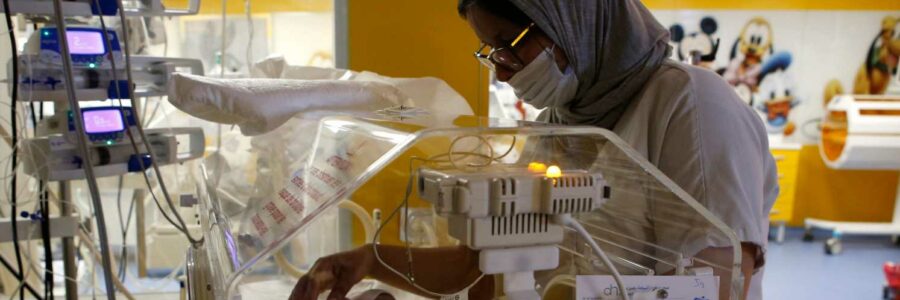
A Malian woman was expecting seven babies. Instead, she gave birth to nine.
A Malian woman went into labor expecting seven babies but gave birth to nine, according to Mali’s Minister of Health and the Moroccan clinic where the nonuplets were born.
The mother, 25-year-old Halima Cisse, gave birth by cesarean section to four boys and five girls on Tuesday.
While in the private Ain Borja clinic in Casablanca, Morocco, Associated Press reporters said they saw some of the babies wiggling their hands and feet inside incubators, according to the AP.
One of the world’s poorest countries, Mali’s hospitals aren’t equipped to offer care for a rare, multiple fetus pregnancy such as Cisse’s. So Malian doctors, under government orders, sent Cisse to Morocco, the AP reported.
Cisse experienced heaving bleeding and was given a blood transfusion after giving birth at just 30 weeks, the Casablanca clinic’s director Youssef Alaoui told Moroccan state TV. The mother is now in stable condition, and the babies weigh about 1.1 and 2.2 pounds, Alaoui said.
Cisse’s birth of nine babies could break the current world record for most living births at once. The Guinness Book of World Records said in an email to USA TODAY that it is still verifying the birth.
The current record belongs to Nadya Suleman, an American woman who gave birth to eight babies in 2009.
A big surprise: They tried to have a baby for 17 years, then had sextuplets
Born together, serving separately: Quadruplets each sign up for military service
Dr. Amber Samuel, a maternal-fetal medicine subspecialist in Texas, has only had one patient give birth to five babies. Even then, she said, the pregnancy was extremely high risk and the mother was susceptible to blood clots, hemorrhaging and losing her uterus.
“There’s dozens of risks with multiple pregnancies, and the more babies a mother is carrying, the more complicated those risks get,” Samuel told USA TODAY.
Most women carrying multiple babies are at-risk for a pre-term delivery. This increases the chances of cerebral palsy, lung disorders, bleeding in the brain and more for the infants, Samuel said.
Alaoui told The AP that “as far as he was aware” Cisse had not used fertility treatments.
As to how Cisse didn’t know she was carrying nine babies, Samuel said undetected fetuses are rare but possible. Without advanced equipment and with multiple fetuses, she said it’s difficult to find each fetus in an ultrasound.
“Everything that involves more fetuses becomes more complicated. Most doctors haven’t seen a woman carry more than four babies, imagine seeing over double that. It’s a complicated situation,” Samuel said.
Follow Gabriela Miranda on Twitter: @itsgabbymiranda
Source: Read Full Article